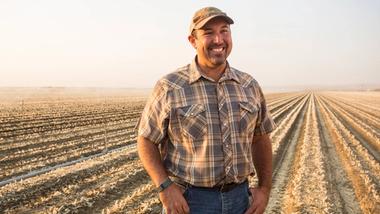
Empowering smallholder farmers
Average read time: 3 minutes
Smallholder farmers are essential to our business as well as the protection of our planet, so we’ve created programmes to empower and support them.

The importance of smallholders
An estimated 500 million people earn their income by working on their family smallholding. With generations of experience, these smallholder farmers often know more about their local growing conditions than anyone else.
Smallholders face a lot of challenges. Life can be hard, income can be low and a changing climate is already affecting harvests, making their livelihoods ever more fragile. There are huge opportunities for businesses like Unilever to help them overcome these challenges.
With the right support, smallholders can be at the forefront of global efforts to protect and regenerate nature. Because if smallholders are empowered to use sustainable and regenerative farming practices, they can replenish the land for current and future generations, boosting yields while building resilience. This way, farmers and their families will thrive, and so will our planet.

We rely on smallholders for a sustainable supply of some of our most important ingredients, including tea, palm oil, vegetables, and cocoa.
That’s why we need to include smallholders in our efforts to promote regenerative farming, protect biodiversity and ensure a deforestation-free supply chain by 2023.
Smallholders are stewards of the land, soil and forests. Integrating smallholders into the value chain is critical to sustainable land use and in protecting forests and biodiversity.
Marc Engel, our Chief Supply Chain Officer
The challenges smallholders face
It’s not easy being a smallholder farmer. Unlike larger farming businesses, few smallholders have access to training, information, farm inputs, and financial support to look after the soil and improve their yields. Many smallholders lack official documents showing rights to their land, which limits their choices of what, when and how to grow. This lack of ability to plan for the future means long term, sustainable farming practices are rarely a priority.
Other systemic factors also hold smallholders back, like gender inequality, health problems and poor access to sanitation. This means there are huge challenges, and huge opportunities involved in supporting smallholder farmers to adapt to regenerative agriculture principles.
We've been supporting smallholders for years in a number of ways: directly with the farmers; with a range of partners; and through certification and other programmes. This work has now expanded to include applying our new Regenerative Agriculture Principles throughout our supply chain, empowering smallholders to earn a living income through sustainable and regenerative practices.
How Unilever is working with smallholder farmers
Smallholders need support to bring their business up to the standards we are upholding in our supply chain. Up until now, our smallholder programmes have aimed to increase profitability for farmers by improving the sustainability of their operations, professionalising their businesses and promoting sustainable farming practices.
Now, our smallholder programmes will focus on our priority crops of cocoa, palm oil, coconut and tea, and will progressively embed our Regenerative Agriculture Principles. These principles are focused on farming practices such as good soil management, water conservation and improving biodiversity. Holistic programmes may also include social elements, such as training programmes on health, hygiene and financial management.
As well as working directly with our suppliers, we partner with NGOs. Together we can offer programmes that seek to professionalise smallholder farming operations, improve yields, diversify crops and help farmers work towards a living income.
The future for smallholders
Smallholders are already feeling the effects of climate change – a situation that tragically, is likely to get worse before it gets better. The livelihoods programmes we have in place are not only helping farmers build resilience in the face of climate challenges today, they are also helping our planet to recover by recovering soil, preserving water and locking away carbon. The more we can give smallholders the tools, support and opportunities to take an active role in the protection of our planet, the better the outcome for everyone on it.
Downloads
- People and Nature Policy (PDF 2.04 MB)
- People and Nature Policy Guidelines (PDF 1.63 MB)
- Responsible Partner Policy (PDF 4.45 MB)
- Sustainable Agriculture Code (PDF 7.88 MB)
- Sustainable Agriculture Code Scheme Rules (PDF 1.33 MB)
- Sustainable Agriculture Code Implementation Guide (PDF 6.65 MB)
- Sustainable Agriculture Code Implementation Guide – Chinese (PDF 17.78 MB)
- Sustainable Agriculture Code Implementation Guide – French (PDF 16.74 MB)
- Sustainable Agriculture Code Implementation Guide – Dutch (PDF 4.04 MB)
- Sustainable Agriculture Code Implementation Guide – Spanish (PDF 17.29 MB)
- Sustainable Agriculture Code Implementation Guide – German (PDF 17.52 MB)
- Sustainable Agriculture Code Implementation Guide – Greek (PDF 4.32 MB)
- Sustainable Agriculture Code Implementation Guide – Italian (PDF 17.34 MB)
- Sustainable Agriculture Code Implementation Guide – Turkish (PDF 4.01 MB)
- Sustainable Agriculture Code Implementation Guide – Polish (PDF 17.67 MB)
- Sustainable Agriculture Code Implementation Guide – Russian (PDF 4.27 MB)
- Sustainable Agriculture Code Implementation Guide – Brazilian Portuguese (PDF 3.51 MB)